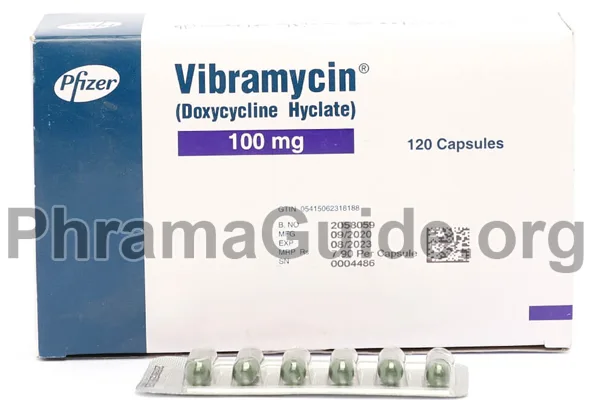Vibramycin is a broad-spectrum antibiotic that is used to treat a variety of bacterial infections. It belongs to a class of drugs called tetracyclines. Following are some common uses of Vibramycin:
- Respiratory Tract Infections: Vibramycin tablet is often used for the treatment of respiratory tract infections, including pneumonia, bronchitis, and sinusitis.
- Sexually Transmitted Infections: Vibramycin is used to treat sexually transmitted infections such as chlamydia, gonorrhea, and syphilis.
- Skin Infections: Vibramycin is effective in treating skin infections such as acne, rosacea, and infected wounds.
- Urinary Tract Infections: Vibramycin can be used to treat urinary tract infections caused by bacteria.
- Malaria Prophylaxis: Vibramycin is used as a prophylactic medication to prevent malaria in individuals traveling to areas where the disease is prevalent.
- Periodontitis: Vibramycin can be used as an adjunctive treatment for periodontitis, a condition characterized by inflammation and infection of the gums and supporting tissues of the teeth.
- Lyme Disease: Vibramycin is an effective treatment for Lyme disease, a bacterial infection transmitted by tick bites.
Off-Label Uses of Vibramycin
- Eye Infections: Vibramycin can be used off-label to treat eye infections, such as blepharitis and conjunctivitis, caused by bacteria.
- Rheumatoid Arthritis: Vibramycin is sometimes used to treat rheumatoid arthritis, a chronic autoimmune disease that affects the joints and other parts of the body.
- Periodontal Disease: Vibramycin can be used to treat periodontal disease, a chronic infection of the gums and bones that support the teeth.
- Prostatitis: Vibramycin can be used to treat prostatitis, an inflammation of the prostate gland that can cause urinary symptoms and pain.
- Chronic Obstructive Pulmonary Disease (COPD): Vibramycin may be used in the treatment of COPD, a chronic lung disease that can cause breathing difficulties.

What is Vibramycin?
Vibramycin is one of the leading brands of Doxycycline Hyclate, manufactured and marketed by Pfizer Pharma Pakistan.
Vibramycin Alternatives : Other Similar Brands
The following are some alternative available brands of Vibramycin and their manufacturers.
- Nordox : Platinum Pharmaceuticals (Pvt) Ltd, Pakistan.
- Etidoxine : Getz Pharmaceuticals (Pvt) Ltd, Pakistan.
- Adoxa : Pharma Health Pakistan (Pvt) Ltd.
- Wellcodox : GlaxoSmithKline (GSK).
- Doxyn : Atco Laboratories Ltd, Pakistan.
- Contimycin : Continental Chemical Company (Pvt) Ltd, Pakistan.
- Doxycycline : Zafa Pharmaceutical Laboratories (Pvt) Ltd, Pakistan.
- Dotur : Novartis Pharma (Pakistan) Ltd.
- Doxicap : Global Pharmaceuticals, Pakistan.
- Doxymycin : Helix Pharma (Pvt) Ltd, Pakistan.
Vibramycin : Available Formulations and Strengths
Presently, Vibramycin is available in Capsule, and Tablet, Forms.
Vibramycin Capsule : 100mg Strength
Vibramycin Tablet : 100mg Strength
Who Should Not Use Vibramycin?
Although Vibramycin can be used safely by most people, there are certain contraindications and precautions that should be considered prior to using Vibramycin tablets.
- Vibramycin should not be used by pregnant women or nursing mothers due to its potential for harm to the fetus or infant.
- Patients with known hypersensitivity reactions (including anaphylaxis) should not take Vibramycin as it may cause an allergic reaction.
- Individuals who have had an organ transplant should not take Vibramycin as this could lead to an increased risk of infection or rejection.
- Patients taking anticoagulant medications (blood thinners) such as warfarin should use caution when taking Vibramycin as this could increase the risk of bleeding complications.
- Due to its photosensitizing effect, patients taking Vibramycin should avoid sun exposure until their course of treatment is completed and their sensitivity has subsided; otherwise, skin rashes may occur due to sunburn-like reactions from UV light exposure.
- Due to its effects on calcium absorption in bones, children under 8 years old and pregnant women should only use Vibramycin under medical supervision; otherwise, they may experience bone abnormalities such as dental discoloration and delayed tooth development in children if it’s taken over extended periods without proper monitoring by a physician.
What is the Recommended Daily Dosage of Vibramycin?
The Recommended Dose of Vibramycin is as follows:
Vibramycin Dose for Respiratory Tract Infections: One tablet of 100mg twice daily for 7-10 days.
Vibramycin Dose for Sexually Transmitted Infections
- Chlamydia: One tablet of 100mg twice daily for 7 days.
- Gonorrhea: One tablet of 100mg twice daily for 7 days in combination with another antibiotic.
Vibramycin Dose for Skin Infections: One tablet of 100mg twice daily for 7-14 days, depending on the severity of the infection.
Vibramycin Dose for Urinary tract infections: One tablet of 100mg twice daily for 7-10 days.
Vibramycin Dose for Malaria Prophylaxis: One tablet of 100mg once daily, starting 1-2 days before travel to an endemic area and continuing for 4 weeks after leaving the area.
Vibramycin Dose for Periodontitis: Half tablet Once daily for 3 months as an adjunct to scaling and root planing.
Vibramycin Dose for Lyme disease: 1-2 tablets of 100mg once daily for 14-28 days, depending on the stage and severity of the disease.
How Vibramycin Works?
Vibramycin involves preventing the bacteria from producing proteins that are essential for their growth and reproduction. The drug does this by binding to certain molecules in the bacteria known as ribosomes which are responsible for protein synthesis in bacterial cells.

Leave A Comment